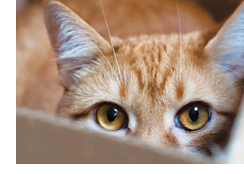
When our pets develop behavioural issues it’s often because of an underlying problem that can be difficult to detect. With cats it is even harder, but we have the ultimate guide to anxious cats and how to help them feel more at ease in or around their home.
Signs your cat is anxious or stressed:
- They hide – An anxious cat prefers to keep hidden in dark places where they can’t be easily seen or reached. They will choose spots close to the ground, such as under furniture, basements, under stairs or in closets and clutter.
- They urinate inappropriately – An anxious cat will spray against vertical surfaces or leave puddles on horizontal ones, mostly for territorial reasons, self-comfort or to warn other animals away. They will typically choose objects with their owner’s scent on them, like your bed.
- They vocalize more – An anxious cat may hiss at the object, person or animal causing them anxiety, or meow more for attention from their owner/s.
Causes of anxiety:
- Physical Health – Because cats are even better at hiding pain than dogs it can be difficult to notice when they are hurt or in pain, especially in the stoic ones. For example, an injured paw may not always cause a limp, but instead increase your cat’s need to hide themselves away.
- Natural Instincts – Our cat’s natural instincts are what have allowed them survive for centuries. This natural need to be cautious and hide often intensifies if there are elements of the unknown in your cat’s environment.
- Stress – This is the most common cause of anxiety seen in today’s cats. Your cat’s stress levels can be affected by a number of things, such as how well they were socialised as kittens, their personality and even genetics. Most commonly, an environmental issue will be the cause of elevated stress levels in your cat, such as new pets, other cats, changed living conditions, climate, crowded situations and the availability of resources.
How to ease anxiety:
- Provide a cat tree
Cats love to sleep, especially in their favourite, comfortable spots. Giving plenty of perching opportunities in a cat tree will be heaven for them. Throw in some cat scratching objects around their sleeping areas and you will definitely increase your cat’s happiness. - Feed their hunting instinct
Try food puzzle toys or hiding small portions of their meal around the house to stimulate your cat’s natural desire to hunt. This is proven to reduce stress and anxiety. - Reduce cat fights
Cats have a tendency to fight. To ease this put a loud bell on the more aggressive cat in your home so the victim has enough warning to hide. - Improve litter boxes
Use the 1 + 1 rule (one box per cat plus one extra) to avoid sharing and locate them throughout the home in a variety of locations. - Use pheromones
Products such as Feliway provide a synthetic pheromone that mimics that which is released when a cat rubs their face against something. This has a naturally calming effect on your cat and can be very beneficial for anxiety.
If you have tried all of the above and your cat is still anxious and stressed then it is time to bring them into Pet Doctors for further advice. There may be more serious underlying causes that only we can determine. Please call us on 5576 0400.

